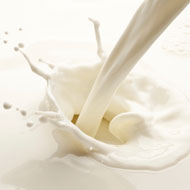Majority of shoppers 'willing to pay more for milk'

Eighty per cent of people said they would pay more for milk if the extra money went to dairy farmers.
A rising number of consumers (80 per cent) say they would be willing to pay more for milk, if all the extra money went to dairy farmers.
British dairy farmers have come under a media spotlight in recent months due to rapidly falling milk prices. As a possible consequence, more and more consumers appear to be sympathetic.
Since October 2013, 74-76 per cent of consumers said they would pay more for milk, according to findings from quarterly YouGov surveys carried out for AHDB and DairyCo. This figure has risen to 80 per cent, according to the latest survey, conducted on February 23-25.
Just seven per cent of respondents said they would not pay more for milk, while nearly one in five said they would be willing to pay over 20p more.
Retail milk prices are falling, partly due to rising competition for market share, and price cuts to key everyday grocery items are an important part of retailers' low pricing strategies.
Commenting on the findings, DairyCo says that while consumers say they would pay more for milk, this may not translate into action. However, the findings do illustrate an increasing sympathy with dairy farmers.
To view more of the findings visit: http://www.dairyco.org.uk/news/news-articles/february-2015/more-shoppers-willing-to-pay-extra-for-milk/#.VO7bXxZvY5Q



 HMRC has invited feedback to its communications regarding the employment status of locum vets and vet nurses.
HMRC has invited feedback to its communications regarding the employment status of locum vets and vet nurses.